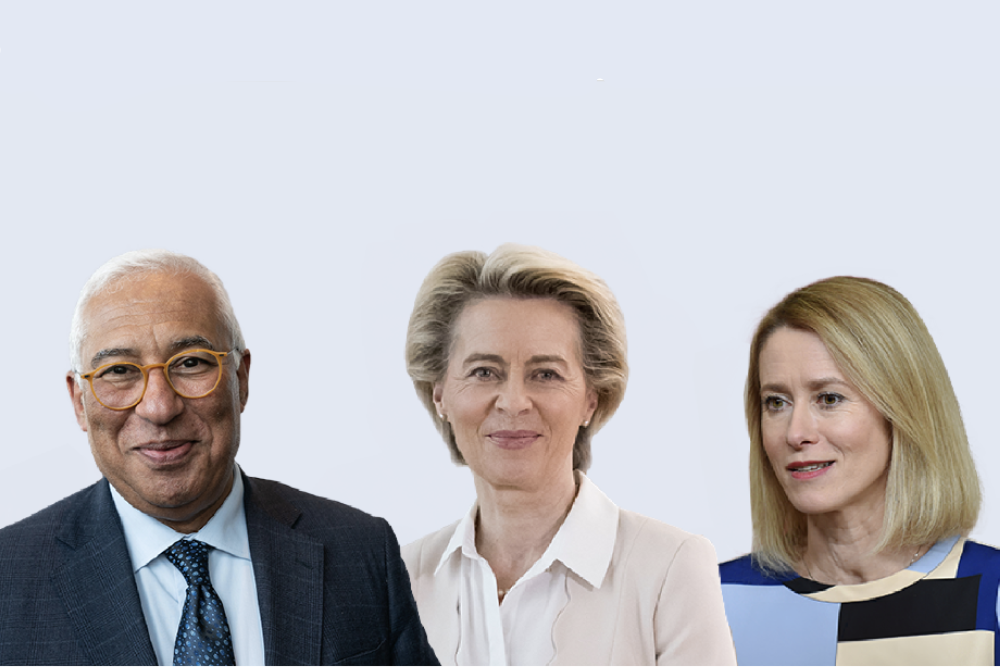Brussels, June 27, 2024 – EU leaders on Thursday gave their political approval to a trio of names—Ursula von der Leyen, Antonio Costa, and Kaja Kallas—to lead the EU’s three major institutions over the next five years.
The EU’s top job ‘package deal’ includes a second term for incumbent European Commission President Ursula von der Leyen from the center-right European People’s Party (EPP), Portugal’s former Socialist Prime Minister Antonio Costa as European Council President, and Estonia’s Liberal Prime Minister Kaja Kallas as the EU’s new foreign policy chief, several EU diplomats confirmed.
It took roughly an hour for EU leaders to agree on a deal after von der Leyen and Kallas left the room, people familiar with the negotiations said.
Italy’s Prime Minister Giorgia Meloni abstained on von der Leyen and voted against Costa and Kallas. Meanwhile, Hungary’s Prime Minister Viktor Orbán voted against von der Leyen, in favor of Costa but abstained for Kallas, according to a diplomatic source.
Kallas, who left the meeting room since she was one of the candidates in the package, transferred her vote to Finnish counterpart Petteri Orpo, said people familiar with the discussions.
In response to her appointment, von der Leyen said she was “grateful” to EU leaders for endorsing her nomination for a second mandate. Costa expressed that he was “looking forward to working closely with them in a spirit of loyal cooperation between European institutions.” Kallas, reacting to her nomination, stated, “Your trust means a lot. We must continue working together to ensure Europe is an effective global partner to keep our citizens free, safe, and prosperous. As HRVP, I will be at the service of our common interests.”
The leaders’ decision comes three weeks after the EU elections, where centrist parties—Socialists, center-right EPP, and Liberals—gained the majority of seats, despite significant wins for the hard-right European Conservatives and Reformists (ECR) and far-right Identity and Democracy (ID) parties.
Von der Leyen’s nomination now requires approval by a simple majority vote in the European Parliament, expected on Thursday (18 July). However, she may have a hard time gathering the 362 votes required for her confirmation. With members of the European Parliament (MEPs) from the EPP, Socialists, and Liberal political groups, she could reach 399 votes, but only if no MEPs rebel against the deal.
Not all national delegations of these groups are guaranteed to back her. She may need to persuade the Greens and possibly some parts of ECR, considered more ‘moderate,’ to ensure her reelection. Should von der Leyen fail to receive parliamentary approval next month, EU leaders will have one month to choose a different candidate and restart the process.
Kallas, as the EU’s next chief diplomat, needs to face a set of public hearings starting at the end of September, when MEPs in the European Parliament’s Foreign Affairs Committee (AFET) and Security and Defence Sub-Committee (SEDE) will be able to question her over her policy vision. Ultimately, the whole College of Commissioners, including Kallas, needs to be approved en bloc by a single vote. After long negotiations between the EU parliamentary political groups and Commissioners, they have agreed on an EU-specific work program for the next five years.
Costa is now considered president-elect and will take over the role on December 1 once incumbent Council chief Charles Michel steps down at the end of November. He is expected to stay in the role for 2.5 years, according to the EU treaties. Based on a gentlemen’s agreement, he could then possibly be re-elected for an extra term.







